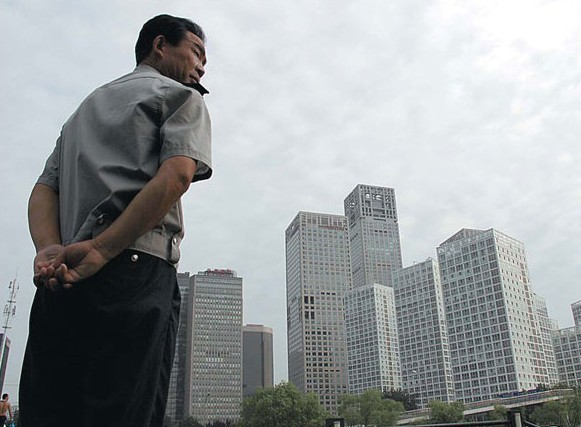

Beijing Financial Street and Jianguomen Central Business District in China's capital city ranked third and fourth as the world's most expensive office areas in the first half of 2013. Provided to China Daily
Reading the market seems to be key to success of global service office provider
Belgium-based Oleon NV, a leading producer of oleochemicals - chemicals derived from plant and animal fats - in Europe, has the largest market share in Europe but it was only last year that it launched its first brand in China, with a team of just three people.
Their office is located in a Regus business center in Lujiazui, Shanghai and the decision to do so is part of a growing trend in China, where flexibility is essential in today's business climate.
"The period of reckless expansion for foreign companies in China is coming to an end," said Jason Ye, China general manager for Oleon NV. "Nowadays, the expansion to new markets such as China is mainly to compensate for the effects of economic turmoil."
Ye's team share the floor with dozens of other small IT and trading companies that are all clients of Regus holding different leases. They share meeting rooms, a central reception, a business lounge and a pantry with coffee, tea and so on.
Despite the small size of the team, Ye said he is looking to expand Oleon's annual sales in China to $30 million within the next three to five years, cashing in on the huge market potential for high-end industrial products in the wake of an increasing national income.
Surging office rentals in China's largest cities and a greater focus on costs amid a sluggish economy are reshaping companies' demands for their workplace, with efficiency and flexibility becoming keywords.
"Office rentals in Beijing are now among the most expensive in the world," said Leijten.
Beijing Financial Street and Jianguomen Central Business District in China's capital city ranked third and fourth as the world's most expensive office areas in the first half of 2013, after Hong Kong Central and London's West End, according to a semi-annual costs survey by CBRE Global Research and Consulting.
Pudong and Puxi, two prime downtown business districts in Shanghai, were among the top 20 in the league.
According to Leijten, the average cost to rent a prime office in first-tier cities is still on the rise. In Beijing, the rent for one square meter per month has increased from 200 yuan ($33) to 350 yuan, up 75 percent, over the past two years.
With robust demand and low supply in downtown areas, he said the high-end office leasing market will remain stable and there is no likelihood rent prices will fall in the CBDs.
On the other hand, with the US and European economies remaining weak and the Chinese economy experiencing a mild slowdown, "companies tend to be more cautious with big and long-term fixed rents and investments", said Leijten, who is ready to tap into the opportunities he sees in the mismatch in the market.
Most multinationals set up their first office in China with only three to five people, but the minimum space of a conventional office in a grade-A office building is normally 200 square meters, bonded to a three-year lease contract, said Leijten.
"The moment you sign up for a lease for three years, it means your business is committed in size and location for three years. That's obviously not an option for companies entering new markets or uncertain about their future, that want more flexibility and control over their costs."
Working in a business center also saves companies from handling other costs such as property management, electricity, air-conditioning, cleaning, maintenance and reception and pantry services, he said, adding that using Regus can save up to 65 percent of costs compared with a conventional office.
"For foreign companies entering China or Chinese companies going overseas, Regus can significantly lower the entry barriers, especially for companies that start small and don't know exactly how the expansion will develop."
The caution of multinationals has helped Regus take some bold steps in China over the past years. Regus' portfolio in China has been growing at 60 to 80 percent a year over the past few years, with a growing share coming from Chinese clients, according to Leijten, a Sinophile whose wife is from Shanghai.
OECD sees China's growth on upswing
2013-09-04Stable growth within China’s reach
2013-09-03Forecasts for growth revised up
2013-09-03Sowing the seeds of sustained growth
2013-09-02Copyright ©1999-2018
Chinanews.com. All rights reserved.
Reproduction in whole or in part without permission is prohibited.